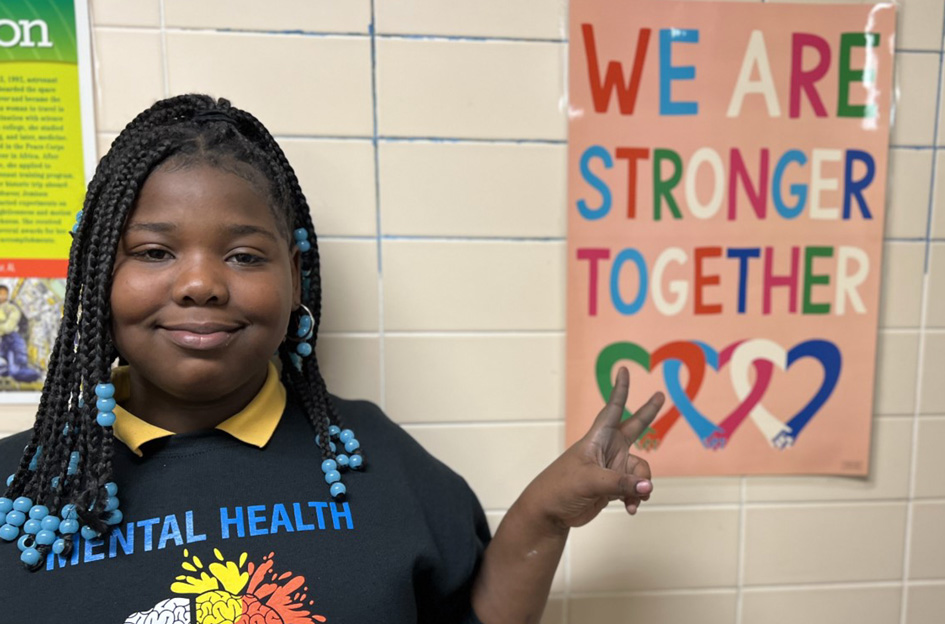
Helping Kids Manage Mental Health: Six Ideas from Boys & Girls Clubs
When it comes to mental health awareness and acceptance, young people like Raivynn are turning the tide. As the 11-year-old from Greater Flint Boys & Girls Clubs puts it, “Mental health matters because you can take care of yourself and live a happy life… because your life does matter.”
When kids and teens feel good about their mental and emotional well-being, they can focus on other priorities like keeping up their grades, forming positive relationships and planning for their futures.
This Mental Health Awareness Month, check out these ways Boys & Girls Clubs are empowering young people with the resources, support networks and coping skills to lead their best lives.
Listening to Youth: What Helps You Feel Better?
Boys & Girls Club of Greater Nashua, New Hampshire
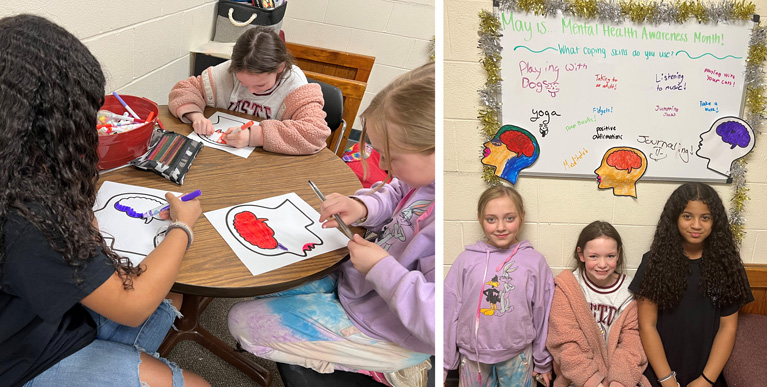
How can pre-teens prepare for the emotional challenges ahead of them? Enter Mighty Minds — a social-emotional wellness group for grades 4-6 at the Boys & Girls Club of Greater Nashua. Members meet weekly to practice different coping exercises that strengthen their emotional resilience. For Mental Health Awareness Month, youth participated in a brain design activity and shared which coping strategies are most helpful to them.
Check out some of their recommendations for useful coping strategies when you’re stressed:
- “When I am really angry, I use fidget toys and they help me calm down.” – Club member, age 10
- “I think that playing with dogs is very calming.” – Club member, age 11
- “Playing with cats helps me when I am upset because they are cute and cuddly.” – Club member, age 11
- “When I’m having a hard time getting out of bed in the morning, I like to do yoga to help me calm down.” – Club member, age 11
- “The outside breeze is really calming when I am sad.” – Club member, age 12
- “Music helps me express my feelings without putting it into words.” – Club member, age 12
Getting Coping Skills Down to An Art
Boys & Girls Clubs of Elkhart County, Indiana
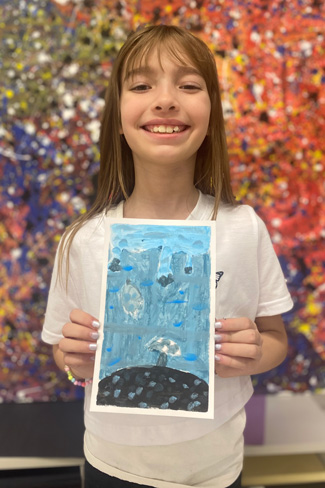
Designed by Boys & Girls Clubs of Elkhart County, the “Art of Emotion” pilot program provides casual art prompts to support youth with processing and expressing their emotions.
The program ran for five weeks with kids using drawing to interpret their strengths as superpowers, like playing video games or being a good friend. Through a painting activity, they engaged with colors to label and identify their feelings, helping to support acceptance of emotions in any given moment. In later weeks, youth practiced “the art of letting go” with vanishing water paintings, as well as mindfulness by listening to calming music with a blindfold on to heighten their senses and emotions.
Members were supportive of each other’s experiences and developed art-based skills for coping with stress that they can practice anywhere. Color us impressed!
Introducing A Four-Legged Friend
Boys & Girls Club of San Marcos, California

It didn’t take long for Otis, a two-year-old golden retriever, to form a special bond with the kids at the Boys & Girls Club of San Marcos. Just ask second-grader Hannah M.: “He makes me feel better when I am having a bad day because he’s cute and soft!”
After many popular afterschool visits, the Club is excited to grow Otis’s impact on youth emotional health by training him to become an official pet therapy dog. In this role, Otis will support youth with developing essential skills like listening, impulse control and social connection. He’ll also de-escalate situations that induce stress, like counseling visits or homework help, encourage physical activity and foster positive animal interactions.
To become a trained therapy dog, Otis has embarked on a certification program. The Club wished him luck at a farewell party, excited for how Otis will make mental health support more accessible and appealing for kids upon his return.
Creating a Safe Haven for Kids and Teens
Boys & Girls Club of Manchester, New Hampshire
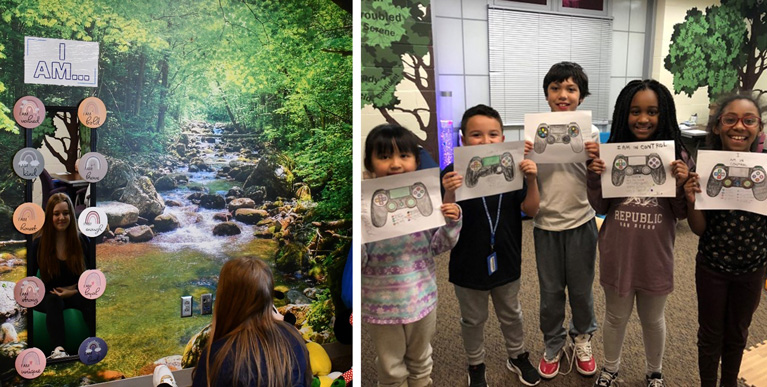
The “Zen Den” at the Manchester Boys & Girls Club is more than a safe space; it’s a hub for kids to learn, play and care for themselves.
Inside is a playground of emotional comforts — from a trampoline and therapeutic swing to a yoga corner, an “affirmation station” and life-size stuffed animals. These assets provide a soothing, sensory-based space for when youth experience sensory overload in other areas of the Club.
In addition to being a physical haven, the Zen Den hosts programs and activities that teach youth how to regulate their emotions, creatively express themselves and more. “I Am” worksheets cover the walls, encouraging positive self-talk (as shown in the video below), while a video game controller activity reminds youth that they are only in control of their emotions and reactions.
The Self-Care Club also operates out of the Zen Den as well as youth counseling services from community partners. Altogether, Club kids can count on the Zen Den for a safe, calming environment when they need it most!
Helping Kids Keep Calm and Carry On
Boys & Girls Clubs of Grand Rapids Youth Commonwealth, Michigan
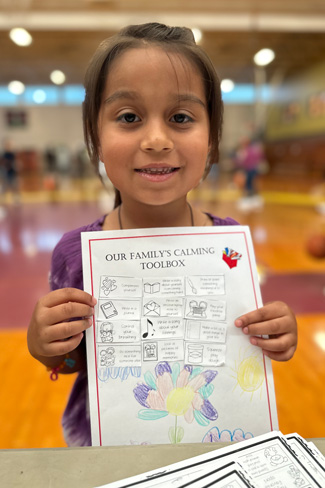
At Boys & Girls Clubs of Grand Rapids Youth Commonwealth, supporting youth emotionally starts when they walk in the door. After dropping off their backpacks, youth communicate how they’re feeling with check-ins using The Zones of Regulation, allowing staff to be mindful of their emotional state throughout the day. Cool-down corners are also popular safe spaces for members to emotionally recharge.
Social work interns monitor these areas and provide youth with de-escalation tools to help process their feelings like deep breathing, journaling, coloring and fidget toys. Since opening these spaces, staff have noticed more members using deep breathing to help calm themselves down, even outside of cool-down corners. Families can even practice coping skills together and discover more Club programs and resources to aid youth well-being at monthly family nights.
Responding to Kids’ Unique Emotional Needs
Boys & Girls Clubs of Whatcom County, Washington
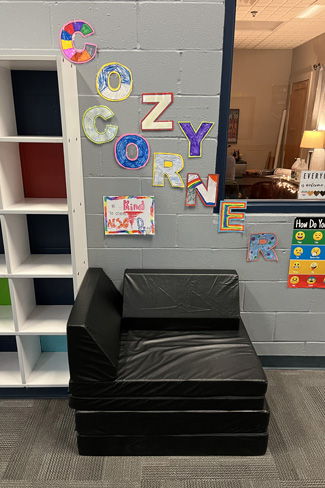
Supporting youth mental health can look different for each young person. To better equip their staff, Boys & Girls Clubs of Whatcom County invested in training to help build trusting relationships with kids in their everyday interactions. For example, to gain young people’s attention, a staff member is encouraged to use a call-and-response chant or a harmonica instead of actions that might be triggering like raising voices, whistles or clapping.
The Club also provides safe environments and resources that serve members’ unique emotional needs. “Cozy Corners” offer kids a comfy space to process their feelings while noise canceling headphones are soothing for kids experiencing sensory overload. Wobble stools are also set up for high energy kids and “TED Talk Tuesdays” foster meaningful conversations with teens about their mental health. When Club staff discover which strategies work best for each child, they pass them along to families and schools to help build a stronger support network for their members.
Kids and teens are more vocal than ever in acknowledging the importance of mental health. Whether they’re speaking up on social media, at the family dinner table or in classrooms, young people know they’re not alone in what they’re going through and find strength in sharing their experiences.
With over 5,000 locations worldwide, Boys & Girls Clubs support young people’s mental and emotional well-being by providing caring adult mentors, safe, inclusive spaces and one-on-one support. Learn more about how we empower youth mental health.
Navigating Mental Health Challenges with Youth
Boys & Girls Clubs of America provides youth mentorship, mental health services and meaningful life experiences that boost youth self-esteem, build confidence and contribute to healthy mental, emotional and physical well-being. Find a Club near you or sign up for our newsletter to receive the latest resources and stories.